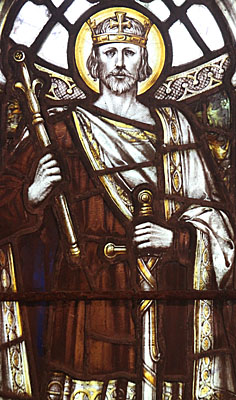 |
 |
|||
|
|
Oswiu
was a son of King Aethelfrith of Bernicia by his third wife of unknown
name. His father was the first King of a united Northumbria, having joined
the the old countries of Bernicia and Deira by force of conquest. However,
in AD 616, King Edwin of Deira returned to
reclaim his kingdom with a mighty army supplied by his ally, King Redwald
of East Anglia. Aethelfrith was killed at the Battle of the River Idle and
his family was forced to flee across the border into Gododdin and thence
to Scottish Dalriada. Along with his half-brother, Oswald,
Prince Oswiu was taken under the wing of King Eochaid Buide and sent to
school at on abbey on Iona. Naturally, the two quickly converted to
Christianity. When
Oswiu was about twenty, his father's killer, King Edwin, fell in battle
against a combined force from Gwynedd and Mercia. The Prince's
eldest half-brother, Enfrith - who had been hiding in Pictland - returned
to Bernicia to claim his inheritance and was eagerly enthroned by their
people. However, King Cadwallon of Gwynedd was in no mood to accept the
rule of an Edwinian replacement and he too was soon slain. In AD
634, Oswiu's other brother, Oswald, decided to try his luck instead.
Having been lent an army by King Domnall Brecc of Dalriada, he was much
better prepared for an encounter with the Welsh and the enemy was put to
flight at the Battle of Heavenfield. Oswiu was almost certainly amongst
the victorious Bernician warriors. Having
been in exile together, King Oswald much favoured his little brother, and
Oswiu seems to have been a central character in the new monarch's
expansionist policies. Only four years after snatching the throne, Oswald
negotiated Oswiu's marriage to Princess
Rhiainfelt, the last heiress of the once great Celtic kingdom of
North Rheged. It seems probable that her father, King Rhoedd, died shortly
afterward, leaving Oswiu as the first Saxon King of North Rheged, under
the overlordship of his brother. The two continued to work closely
together and Oswiu headed up the Northumbrian army which conquered
Gododdin in AD 641. Unfortunately however, despite such successes, the
Welsh and Mercians were not subdued
and, the following year, they rose up with a great force. King Oswald
marched south to meet them on their home ground, but was killed at the
Battle of Oswestry. Prince
Aethelwald being rather young, his uncle, Oswiu, then took the throne. He
may have been in Rheged at the time of the battle. However, Oswald
had been the son of a Bernician father and a Deiran mother and was thus
acceptable to both kingdoms of Northumbria; Oswiu was not. Deira rejected
his rule and the late King Edwin's cousin, Oswin,
managed to to re-establish his dynasty there. Since his wife was now dead,
the new Bernician monarch
tried to counter this move by sending for Edwin's daughter, Princess
Enflaed, who was in exile in Kent. The two were married at Bamburgh in AD
643, but the Deirans still preferred their own King and armed conflicts
followed. While Oswiu was busy fighting a civil war, the Mercians became
strong once more. They rose up and wrested Elmet and Lindsey from his
control. Under pressure, therefore, King Oswiu seems to have sought new
allies and it was around this time (c.AD 650) that he spend some time in
Ireland. He, apparently, had an affair with Princess Fin, the grandaughter
of Colman Rimid Ui Neill, and their son, Prince Aeldfrith, was born soon
afterward. In
AD 651, Oswiu raised a great army for a one last push against Oswin of
Deira. But the latter refused to engage him and hid out in Gilling.
Completely frustrated, Oswiu had him assassinated: a shameful and
unpopular move for which he was later obliged to turn the estate where the
act took place into a religious establishment. It also failed to secure
Deira for him. For the people - possibly with Mercian help - raised
to the throne, the late King Oswald's son, Prince Aethelwald. About this
time, Oswiu married his eldest son, Prince Alcfrith, to King Penda of
Mercia's daughter, Cuneburga, possibly in an attempt to stop further
interference in Northumbrian affairs. The scheme did not work and, the
following year, Penda, for a short while, was besieging Oswiu in the far
north of his kingdom, at Bamburgh. In AD 655, he was back again with an
even stronger force, swelled by his British allies in Wales. Oswiu's
army was only a third the size and he, therefore, fled north to Stirling,
his most northerly city. From the safety of the borders with Pictland -
from where his nephew, King Talorcan I, had probably recognised his
overlordship - Oswiu sent envoys to offer Penda offering bribes in return
for his withdrawal. The Mercians took the cash and distributed it amongst
their British allies. But the money had come from the oppressed Northern
Britons of Gododdin, so Oswiu's British enemies viewed it as a restitution
of their own property and ravaged Bernicia anyway. The two armies clashed
at the Battle of Winwaed, but the forces from Gwynedd and Deira,
unexpectedly withdrew. Penda's severely depleted force lost the battle and
the man himself was killed. At
last, Oswiu was King of a united Northumbria, like his father and brother
before him. He appointed his son, Alcfrith, as sub-king in Deira and
allowed Penda's Christian son (and Oswiu's son-in-law), Peada, to
remain in Middle Anglia. The latter was murdered the following year,
however, and Oswiu extended direct rule into Mercia, invaded Pengwern and
killed King Cynddylan. The Mercians did not re-establish their independence
- under Penda's youngest son, Wulfhere - until AD 658. Oswiu also tried to
further extend his power northwards, by invading Pictland, in AD 663, a
few years after the death of his Northumbrian-friendly nephew, King
Talorcan I. However, there
seems to be little support for Bede's claim that he made tributary the
Dalriadan Scots. Meantime, troubles of a different kind were brewing for
King Oswiu. About AD 660, his son, King Alcfrith of Deira, fell under the
influence of Abbot Wilfred of Ripon and
began to follow a religious policy completely independent of his father.
He rejected the Celtic traditions of the Ionian Church and turned instead
to the ways of Rome. Alcfrith was soon removed, but this religious
controversy could not be ignore. The two parties could not agree on the
correct form for calculating the Easter dates and the argument dominated
Northern politics for the next four years, until, in AD 664, King Oswiu
agreed to call the Synod of Whitby (Streoneshall)
at the abbey in that town. Oswiu
had always been interested in matters of the church. He had been
instrumental in the foundation of Melrose Abbey around AD 650 and it was
during his reign that St. Cedd's mission
had left Northumbria to re-establish the See of Essex. The King had even
allowed his daughter, Aelfflaed, to
become a nun at Hartlepool, under her second cousin, St.
Hilda. The two had since moved on to Whitby, hence the King's
choice of venue. The timing appears to have been due to the fact that, if
the method for calculating the date of Easter was not standardised in
Northumbria, the following year, the King and his Kentish wife would be
celebrating the feast on different days! Bishop Colman of Lindisfarne
& Abbot Wilfred of Ripon argued it out in front of the King. They
appear to have agreed on little, until Colman was forced to admit that, as
Wilfred insisted, St. Peter did indeed hold the keys to the kingdom of
heaven. The impatient monarch then interjected that St. Peter's successor
in Rome must therefore know when Easter should fall and abruptly closed
the meeting with a knowing smile. Colman
resigned his see in protest soon afterward and Wilfred eventually
succeeded him, but moved his Episcopal seat to York. His rule was short-lived
however. Claiming there is no-one in Britain with the authority to
consecrate him, he left for France and was enthroned by the Archbishop of
Paris. Wilfred liked the Frankish Archiepiscopal court so much that he
delayed his return and King Oswiu decided to appoint Abbot Chad of
Lastingham as Bishop of York instead. King
Oswiu died
in AD 670 of natural causes. He was buried in Whitby Abbey and succeeded
by his sons, Egfrith as overlord of Northumbria and Aelfwin as sub-King of
Deira.
|
|||
| © Nash Ford Publishing 2003. All Rights Reserved. | ||||





